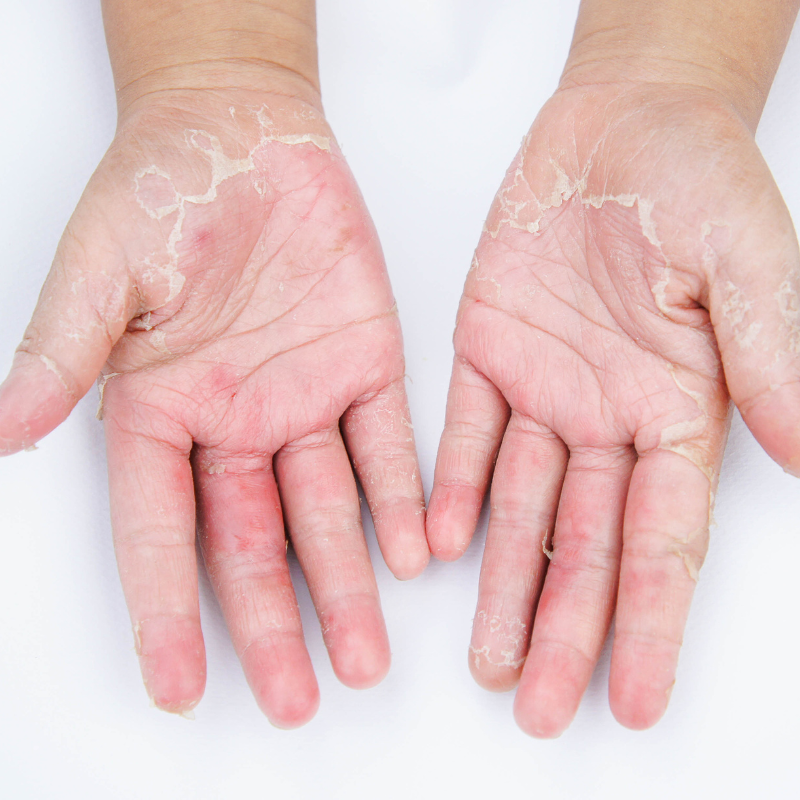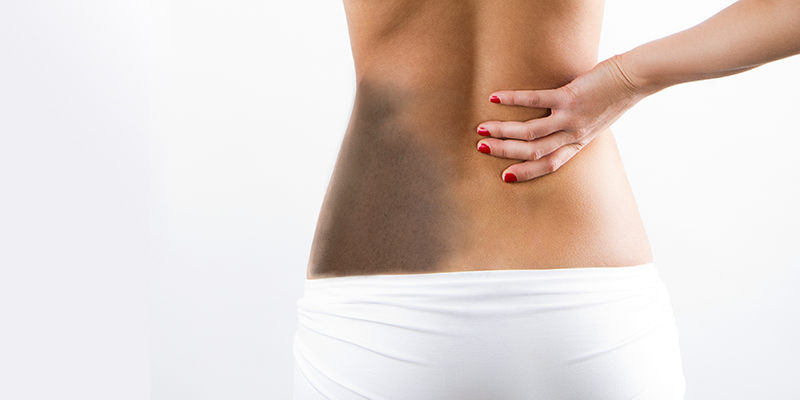In This Article
Skin Peeling On Hands: Causes, Treatments & Prevention
Our hands are constantly in use, regularly coming in contact with different things, chemicals, items, and applications, and are also always exposed to the elements in our environment. It is crucial to understand that the skin on our hands, just like any other part of our body, requires care and attention, and it is only natural for it sometimes to get affected. Skin peeling on hands is an indication your hands are responding to certain environmental conditions or you have an underlying health concern [1] that needs to be addressed. If you are concerned about the peeling skin on your hands, this article will help you understand the various causes of flaking skin on hands. We will also discuss the different hand skin peeling treatment options that can help manage skin flakes on hands.
In This Article

What Causes Peeling Skin On Hands & Treatments For Hand Skin Peeling?
If the skin on your hands is constantly peeling, consult a dermatologist. They may perform a physical examination or run diagnostic tests to correctly identify the cause of the condition and suggest a hand skin peeling treatment accordingly.
However, here are some of the most common causes of skin peeling on hands and the treatments for the same:
Psoriasis
This chronic condition often leads to flared-up, patchy skin, mostly on the hands [2]. The skin remains inflamed for weeks or even months. The most common cause of psoriasis is an overactive immune system, which causes the skin cells to multiply quickly.
Treatment Method:
There is no sure cure for psoriasis, although the symptoms can be managed to prevent frequent flare-ups. Topical or oral corticosteroids are often prescribed to control skin inflammation. Light therapy is another alternative.
Eczema
Also known as atopic dermatitis, eczema usually appears in childhood as a red inflamed rash. It is common on hands and cheeks. Itchy, flaky, crusty or peeling skin are some signs of eczema.
Treatment Method:
The management of symptoms by identifying triggers is the most reliable cure for eczema. Most doctors prescribe topical or oral corticosteroids, and some may also suggest controlled exposure to UV light (Light Therapy) to manage the symptoms and offer relief.
Handwashing
While regular handwashing is a good habit, over washing hands with strong cleansers can lead to skin peeling . In addition, many activities need frequent hand washing including cleaning, washing clothes, washing utensils, gardening etc. Besides these, certain professions like baking, healthcare, construction, farming, and fishery also require people to keep washing their hands from time to time. This may irritate the skin and make it prone to peeling.
Treatment method:
-
- Use soaps that are gentle and hydrating
- Use products with glycerine to protect skin moisture
- Use moisturisers containing shea butter and cocoa butter whenever possible during the day to prevent the hands from drying out.
Kawasaki Disease
This disease is common in children, where the skin on the hands and feet is acutely inflamed. Kawasaki disease leads to inflammation of blood vessels, resulting in symptoms like fever, swollen lymph nodes and skin peeling [4].
Treatment Method:
It is important to treat the Kawasaki disease immediately to prevent long-term effects on the heart. Most patients are given intravenous immunoglobulin (IVIG), and low-dose aspirin is necessary to avoid complications.
Skin Allergies
Allergic reactions to substances like nickel, latex, or certain skincare products can cause skin irritation and peeling.
Treatment methods:
The best treatment in this case is to identify and avoid the allergens. Topical corticosteroids and antihistamines can also help alleviate the symptoms.
Chemicals
Many people are regularly exposed to chemicals in their daily jobs. Exposure to harsh chemicals in cleaning products, solvents, or other substances can damage the skin barrier, leading to irritation and peeling. Sometimes, such exposures may also lead to chemical burns.
Treatment Methods:
If possible, avoid using the chemical immediately. If this is not possible, use protective gloves when handling the chemicals. Also, moisturising creams and barrier ointments help heal and protect the skin.
Climate
Dry, cold weather can strip moisture from the skin, making it rough and causing peeling. This is often worsened by indoor heating, further dehydrating the skin, breaking its protective barrier. Such skin is more prone to allergens and chemicals, further aggravating the condition of skin peeling on hands.
Treatment Methods:
Use a humidifier to add moisture to the air. You can also apply thick, emollient creams or petroleum jelly to maintain skin hydration.
Sunburn
Excessive sun exposure can damage the skin, causing it to burn and peel as it heals. This is the skin’s protective mechanism to shed damaged cells.
Treatment Methods:
Apply aloe vera gel or cooling lotions to soothe the skin. Make sure you stay hydrated, wear protective clothing and avoid further sun exposure. Use a broad-spectrum sunscreen with SPF 30 or more to prevent further sun burning.
Acral Peeling (Peeling Skin Syndrome)
Acral peeling skin syndrome is a rare genetic disorder. It causes painless peeling of the outermost layer of the skin on the hands and the feet. The exact cause is related to mutations affecting skin cell adhesion.
Treatment Methods:
There is no cure for flaking skin on hands caused by this disorder. However, emollients and moisturising creams with lanolin and glycerine can help manage the symptoms. Avoiding triggers that may aggravate the peeling is also advised.
Vitamin Imbalance
Vitamins play a significant role in maintaining skin health. Their deficiencies, especially those of vitamins B3 (niacin), B7 (biotin), and A, can cause various skin concerns, including dryness and peeling.
Treatment Methods:
Vitamin deficiencies can be addressed through appropriate dietary changes and supplementation. However, consulting a dietician or dermatologist for guided changes and vitamin dosage is best.
Dry Skin
Lack of moisture in the skin can lead to dryness and peeling. People often have a dry skin type that, if not moisturised adequately, tends to peel. This is common with hands as we wash them frequently. Environmental factors such as low humidity or excessive cold often worsen the condition.
Treatment Methods:
Apply moisturiser regularly, especially after washing hands. Look for products containing ingredients like glycerin, shea butter, or hyaluronic acid.
Fungal Infections
Many times, fungal infections may be the cause of skin peeling on hands. Tinea manuum is one such fungal infection that may start on the palms and spread quickly to the upper hands and fingers. It causes sores that lead to flaky, dry, and itchy skin that eventually starts to peel.
Treatment Methods:
It is best to consult a dermatologist for this condition. You will be prescribed an antifungal topical ointment for relief.
Strep Infection
Certain strains of streptococcus bacteria can cause skin infections. Scarlet fever and impetigo are conditions that cause redness and blisters. When the infection starts to clear, the skin begins to peel.
Treatment Methods:
Your doctor may prescribe a course of antibiotics to treat the underlying infection. Keeping the skin clean and applying soothing lotions can help with symptom relief.
Certain Medications
Some medications can cause skin reactions, including peeling, as a side effect. Common culprits include certain antibiotics, antifungals, and chemotherapy drugs.
Treatment methods:
Consult a healthcare provider to adjust the medication. Topical treatments can help alleviate the symptoms while the medication is being reviewed.
Toxic Shock Syndrome (TSS)
Toxic Shock Syndrome is a rare, life-threatening condition caused by bacterial toxins. It causes high fever, rash, and peeling skin. It is often associated with tampon misuse and skin wounds.
Treatment Methods:
Immediate medical treatment is essential, often involving antibiotics, intravenous fluids, and supportive care. Early intervention is critical to prevent severe complications. In very severe cases, an influx of antibodies may be required from healthy donors to prevent multiple organ failure.
NOTE:
It is important to understand that skin peeling caused by an underlying health condition needs immediate attention. It could be a symptom of a more serious health concern. Hence, never ignore persistent skin peeling that seems to go beyond mere temperature change and dryness. Always get yourself a timely consultation with a dermatologist.
Must Read: Skin Peeling On Fingertips
How Can I Prevent Skin Peeling On Hands?
Once you understand the reason behind skin flakes on hands, you can take corrective measures to prevent or reduce the extent of the condition. While not all types of skin peeling can be controlled, here are some tips that may help prevent flaking skin on hands:
-
Wear Gloves:
It is best to keep your hands protected and wear gloves if you are working in the garden, doing dishes, or working with any chemicals. This prevents environmental factors and chemicals from affecting the skin on your hands.
-
Use Lukewarm Or Normal Water:
When washing hands, try not to use water that is either too hot or too cold. Extremely hot and cold water both dry hands and result in flaky skin.
-
Keep Your Hands Well Moisturised:
Throughout the day apply a gentle moisturiser to keep your hands hydrated. Thick creams work well on flaky skin. Make sure it does not contain harsh chemicals.
-
Try Petroleum Jelly:
When you experience extreme skin peeling on hands, with dry flakiness apply a thick coat of petroleum jelly before sleeping. Cover your hands with a muslin wrap or cotton gloves. This helps lock the moisture in and soften the peeling skin to prevent discomfort and scratching.
-
Avoid Skin Irritants:
Many soaps, deodorants, and toiletries contain sulphates, alcohols and fragrances, which may irritate and aggravate peeling skin. Check and buy products that are mild and irritant-free.
-
Wear Sunscreen:
Skin flakes on hands often get worse due to exposure to sunlight. Always apply sunscreen when you are stepping outside, more so if you are driving, for added protection.
-
Maintain Humidity During Winters:
The colder months of the year often dehydrate the skin. Your hands can dry out more than usual, leading to skin peeling. Using a humidifier keeps the air in your space moist and hydrating.
NOTE:
If you cannot identify the exact reason the skin on your hands is peeling and none of the above remedies are working, it is best to consult a dermatologist. An expert can help identify the cause and suggest an appropriate treatment for hand skin peeling.
When To Consult A Health Care Professional?
Here are some scenarios when you should consider consulting a healthcare professional regarding flaking skin on hands:
- When skin peeling on hands persists, neither home remedies nor over-the-counter treatments offer relief.
- If flaky skin is not the only symptom and the skin peeling on hands is accompanied by other signs like swollen lymph nodes, nausea, fever, or rash.
- If the peeling is painful, shows signs of infection and has pus, it is time to show it to a dermatologist to get immediate hand skin peeling treatment.
Takeaway
Skin peeling on hands could be either due to exposure to harsh environmental conditions, pollutants, or chemicals. It can also be due to an underlying health condition. It is, therefore, best to understand what is causing the skin on your hands to peel and take the appropriate hand skin peeling treatment from an experienced dermatologist.
Expert guidance prevents it from aggravating further.
Frequently Asked Questions On Peeling Skin On Hands
It could be due to exposure to environmental factors like excessive heat or cold. It may also peel due to overwashing, harsh soaps, exposure to chemicals, allergic reactions or as a side effect of an underlying health condition.
Deficiency of vitamins like B3, A, and B7 may cause skin peeling on your hands [5]. A deficiency of zinc and essential fatty acids can also lead to skin peeling.
When your peeling skin starts to bleed, show signs of infection, has pus oozing out, or is painful, it is a cause of worry. You must immediately consult a dermatologist.
Stress does not directly lead to skin peeling, but if you already have skin conditions like eczema or psoriasis, it can worsen these conditions. Skin peeling on fingertips is a common side effect this case [6].
This is usually because of harsh weather conditions – too cold or too hot, exposure to extreme water temperatures while washing hands, or frequent hand washing with a strong soap.
Read This Next

Laser Treatments for Face & Skin in Hyderabad: Cost & Process – Oliva Clinic

Best Foods for Pimples: 30-Day Acne-Free Diet Plan & Clear Skin

How to Increase Collagen Production: Treatments, Foods & Supplements

18 Effective Skin Care Tips For Getting Glowing Skin Naturally

Mongolian Spots – What Causes It And How To Remove It?



